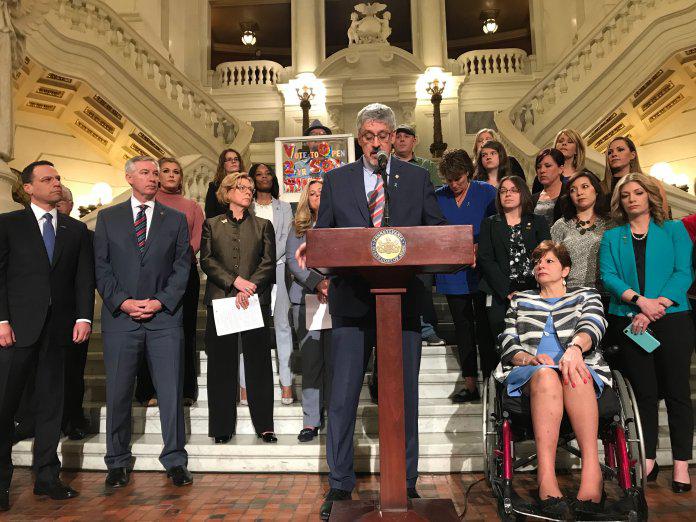|
Pa.’s recently approved statute of limitations reform fell short. This is how | Opinion
By Tim Kearney And Katie Muth
It has been over a year since the release of the grand jury report that unveiled widespread sexual abuse by the Catholic Church in Pennsylvania. The report showed, in horrific detail, how 301 priests preyed upon more than 1,000 children over seven decades. For generations, Pennsylvania’s statute of limitations barred many survivors from seeking legal recourse and shielded their predators. For generations, powerful institutions, such as the Insurance Federation, and their lobbyists blocked reforms and escaped liability for their crimes. Survivors suffered under the weight of their abuse, silenced by the law, while their tormentors walked free. Last year, before our election to the Senate, the General Assembly was on the finish line of passing the grand jury’s recommendations when the Republican majority adjourned the session. This year, the legislature finally approved a small but meaningful measure of justice. We passed laws to eliminate the criminal statute of limitations for childhood abuse and raise the age to file civil suits from 30 to 55. This law also gives survivors, whose abuse happened between ages 18-23, until age 30 to file civil claims and 20 years after the offense for criminal claims. This will open the courthouse doors for many survivors who have been denied justice for too long. We had a moral imperative to pass these reforms, because any improvement is a step in the right direction. We could not punt on justice again after we failed survivors last session. But we are not declaring victory yet. The legislature missed an important opportunity to provide a pathway to justice for all survivors. While these changes will help those who are sexually assaulted as children, the criminal statute of limitations remains unchanged for those who are assaulted as adults. Assault is assault, no matter what the age. The message to adult victims is clear: You are not important enough. These are not the only shortcomings. The Legislature is requiring a constitutional amendment to create a two-year window to revive civil claims that have expired. This approach kicks the can down the road because it will take years to go into effect – and that is only if things go perfectly. For a constitutional amendment to pass, lawmakers must approve the exact same language again next session and then it would go to voters as a referendum. Survivors have waited long enough for justice, and now we are unnecessarily asking them to wait even longer – with no guarantee of success. A statutory window is supported by Pennsylvania’s Attorney General and has been upheld in seven other states; earlier this month, a statutory window went into effect in New Jersey. Justice delayed is justice denied. Some claim a constitutional amendment is a quicker path to justice because it would avoid a time-consuming battle in the courts. But if time was truly a concern, we could have simply passed both legislative and constitutional remedies. As newly elected senators, we offered multiple amendments to prevent a further delay of justice. In the end, the Senate rejected our proposals along party lines. We commend the survivors who have turned their suffering into activism, without whom these reforms would not be possible. We also stand with the survivors whom these changes leave behind. We will not stop fighting for all survivors, because we came to the Senate to give a voice to those who have been voiceless for too long. But we cannot do this alone. The time is now for the public to hold elected officials accountable to ensure justice and healing for all survivors.
|
.
Any original material on these pages is copyright © BishopAccountability.org 2004. Reproduce freely with attribution.
